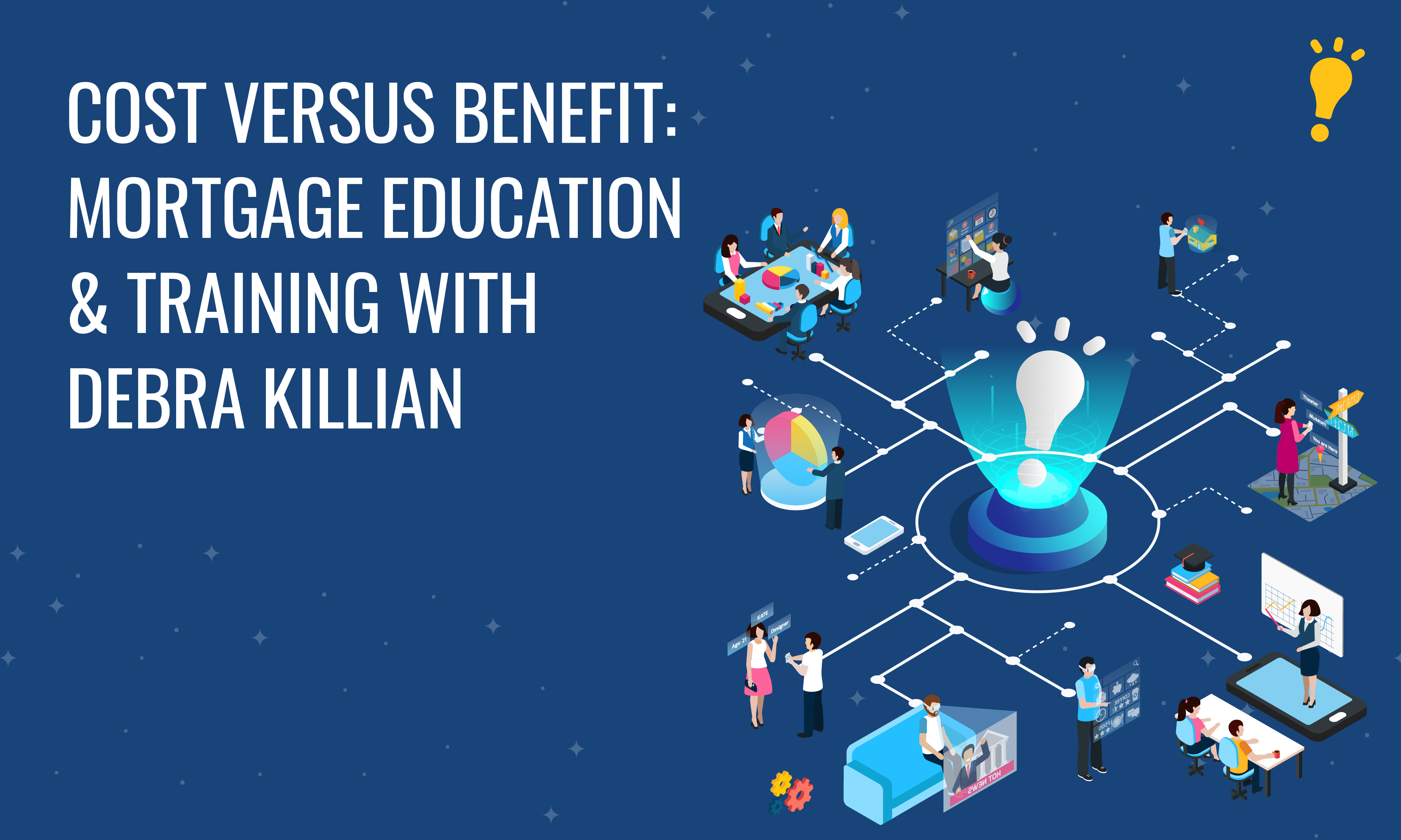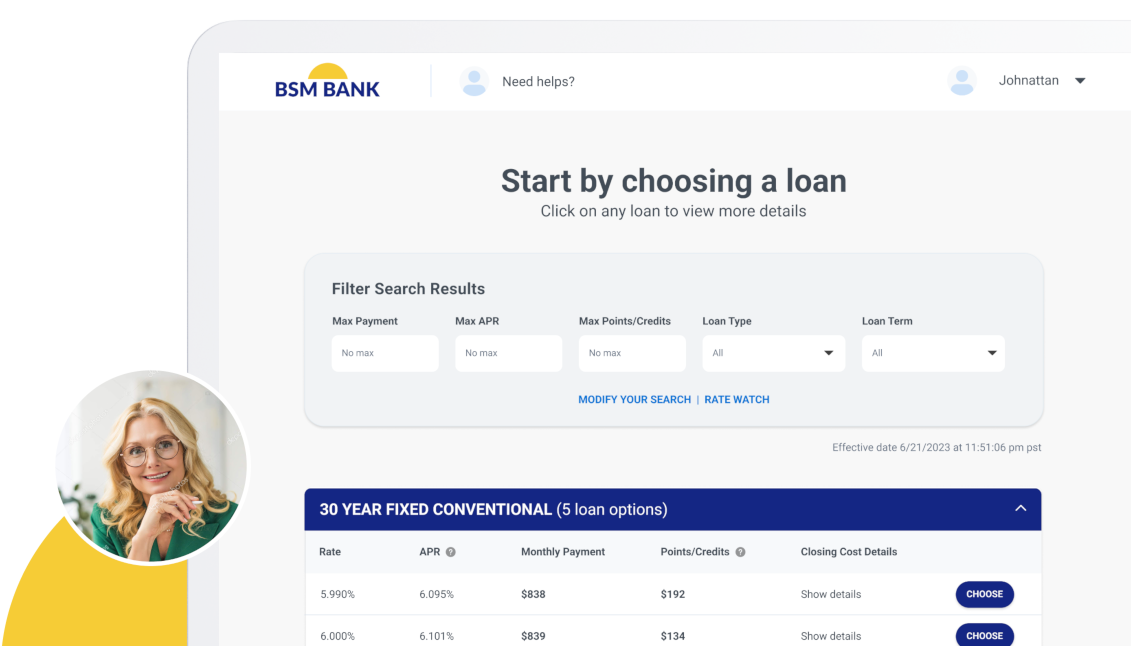Debra Killian, CRMS, founder and president of Charter Oak Lending Group and CLOES.online, shares insights on the value of standardized mortgage education and training, prioritizing reinforcement of learning and retention, and preparing for the future of continuing education (CE) in a remote work culture.
SABRINA PARK: You’ve been in the mortgage business for 26 years as a broker and as a passionate advocate for education. Having written one of the first 20-hour origination courses before the SAFE Act was passed and training thousands of originators through the School of Loan Origination a 24-hour course you wrote for the Mortgage Bankers Association’s (MBA) please share with our audience why you believe education and training to be so important in the industry? What is lacking and how can the system be improved?
DEBRA KILLIAN: Before 2008, when the market crashed. There wasn’t really any standardization of any type of mortgage education. Each state may have had their own versions of curriculum, while others had no requirements at all. I believe Florida required a few hours of education, but short of that, and prior to that, there wasn’t really anything.
I had previously owned an accounting business and thought that it was absolutely ridiculous that people could take an application, make a lot of money and get somebody into the largest debt of their life, but not really need any education.
Fast forward some years, and federal regulators came out with the Secure and Fair Enforcement for Mortgage Licensing (SAFE) Act. This did two things. It said:
- We need to know who all these originators are that originated these loans.
- We need to create standards for education and testing.
But, this is still an issue. The education requirement was a fast response and didn’t go far enough. It teaches you the laws that you have to know to comply, protect consumers and do the right thing, so to speak. But, it really doesn’t teach you anything about the business. So, now, we have a lot of people in the business out there who’ve been doing this for a long time, but that have never been through any standardized curriculum. What we’re creating is a learning platform for all originators to help them gain foundational knowledge. This way, we’re all working from the same basic premises and the same concepts. Accountants have to go through an accounting program. Financial planners have to go through their series, licensing and education. In this industry, for some reason, the value of education has been missing.
SP: Can you share a little bit about why you don’t think there’s been a heavy enough focus on standardized education in the mortgage industry?
DK: So many people have just learned as they’ve gone. They’ve been around so long that they really believe that they know the business; however, I would venture to say that many seasoned originators would not be able to pass an exam from one of our programs. Why? Because they’re used to doing it their way. Well, who taught him? The guy that hired him, who was taught by the woman that hired him. There’s no commitment to education and there’s no reason to commit because no one’s asking for it, right? In short, people don’t see the need because they’ve been doing it forever and it works. Sure, they mess up files once in a while, but for all intents and purposes, it works.
SP: Beyond licensing, continuing education and compliance training, what are your thoughts on mortgage technology platform training?
DK: That’s an interesting question. I’ve owned my own mortgage company for 25 years, so I haven’t worked with some of these platforms, but here’s what I think.
I think originators could potentially be shooting themselves in the foot, so to speak. If you expect all this technology to do everything for you, the customer is losing out here.
For instance, If you can’t calculate closing costs or do other things that make you have a better dialogue with your consumer, you’re not doing anybody any favors. I think the originator can be losing out on fully understanding what it is that the customer’s trying to accomplish. Educating the customer in the process, and making sure that the best options are being offered, I think there’s a lot that we take for granted because technology is doing it for us.
When I teach my courses, I always tell my students, “If you were standing in the parking lot of a mall, and somebody said to you, ‘Hey, you know what? I need to refinance.’ You should be able to take out a piece of paper and a pencil, and figure out their closing costs.” I think the technology piece is good, helpful, and in many cases, we couldn’t do without. I can’t see it being the be-all and end-all because, eventually, either the consumers are not going to get served well or originators are going to work themselves right out of a job. the technology thing is kind of a tricky one.
SP: Suppose the ultimate goal of the company is to create a culture, where their LO’s work in tandem with the platform, versus relying on the technology to do all the work for them. Technology isn’t taking over the LO’s job at all, but rather increasing the LO’s efficiencies. I’d liken it to more of a marriage of the two, with the end goal of offering the ultimate borrower experience. Do you think, in this case, that it’s just as important for the LO’s to go through training to understand how to optimize their technology systems and make them work for them so that they can better serve their borrowers?
DK: Absolutely. Technology doesn’t stand alone, it’s a tool. It’s like… a hammer is not going to build a house. Someone who knows how to build the house is going to have to pick up the hammer and find the nails to build the house, right? Technology is the tool, but I don’t think it’s being treated that way. We’re not marrying the knowledge of the individual with the tools they have available.
SP: How can leadership prioritize training and development within their organizations?
DK: This is an interesting question too. I’ve been thinking about types of tools and polls of people, if you will, in a mortgage business.
You’ve got the individual originators who really want to learn, but don’t know where to go or what to learn. They don’t know what they don’t know! You may, or may not, have an environment or a culture that not only supports that, but encourages that. Then, you’ve got cultures where the wrong type of training is being crammed down people’s throats that are experienced and don’t want it.
In my opinion, continuing education doesn’t serve the purpose for which it was intended. People view it as a necessary evil. They just want to get in and get it over with, whether they learn anything from it or not, who knows? I think people could really be utilizing education. Companies should want the best customer experiences and experts in the field. They should want the best of the best,and encourage, support and nurture their LO’s.
That’s exactly what we did in our company. I had a company with 20 originators and branch managers in multiple offices. I think that’s really what it takes—the company. If management hasn’t bought into it, there will be no way to sustain an educational platform or ongoing training.
SP: Do you think compliance training timelines allow enough time for LOs and brokers to fully understand rule requirements before effective regulation dates?
DK: No, that’s where reinforcement comes into play. You took the training and learned the material, but as regulations change, the environment changes—the interest rate environment, the risk environment, etc. how do you learn?
Training and education doesn’t have to be every week or month; however, it should be regularly scheduled, expected, supported and encouraged. This is information that the entire company should know. The compliance piece is a big one.
When I wrote the School of Loan Origination for the Mortgage Bankers Association (MBA), and then started teaching, one thing kept coming up. I realized that loan originators, all over the country, don’t think they needed to know this stuff. They didn’t realize how much they didn’t know.
When I approached the MBA, at the very beginning before we started, one of the things I said is nobody’s focusing on what’s happening at the kitchen table. We’re in the middle of a financial collapse (this was back in 2007-2008), there were servicing problems, lost mitigation problems, foreclosure problems, real estate values dropping, people not paying their mortgages.
I kept my focus on this: if we paid attention at the front of the transaction, maybe we won’t have all these problems in the back of the transaction. It took a couple of years for somebody to say, ‘hey, maybe she’s onto something.’ This is when we wrote the MBA School of Loan Origination. Now, we have our own school [CLOES.online](), and I don’t teach with the MBA anymore.
A lot of training is missing. It’s either a one-off course on this topic or that topic. Nobody’s really connecting the dots, pulling everything together or weaving a story so that originators have a base knowledge of how it all flows together, and then how to best utilize that. Again, this is for the benefit of the consumer and also to differentiate originators from one another.
SP: What kind of training formats, platforms or courseware have you found to be the most effective as far as retention of information is concerned?
DK: I think the regularity or frequency of training helps keep a person moving forward in a direction toward an end goal of having this whole complete picture.
Most people would say, in general, that nothing beats having a live instructor in front of a class that’s engaging and can get people excited. That’s where I think the passion comes out and that is contagious for people. Well, there are a lot of things that are contagious now, so live training is probably not going to happen for a while.
The most important thing for retention is what people hear—whether it’s in a webinar or a self-paced video course—things that they can use the next time their phone rings, on the next customer. These are things that are applicable to what they do every day. Back to your question about whether or not there is enough time for compliance training… It takes time to absorb this information. People really need to understand everything about this business to do it well. There should be reinforcement of learning because retention comes from hearing something that’s applicable.
Homework assignments, quizzes, assessments should all be required to make sure that LO’s retain and capture the essence of what that content is really all about.
I talk to students all the time who say, ‘I just don’t get that.’ And then I say, okay, let’s look at it from the consumer standpoint. What if you’re the consumer and this originator says this to you. What does that do to you? Does it make you feel like they’re acting in your best interest? I think that the retention comes from the connection to the material and then being required to be challenged through testing. In the School of Loan Origination, we had everyone read a book and do a book report. A lot of people freaked out. They were concerned because they hadn’t done a book report since high school. Ironically, I’ve received many emails thanking me for requiring the book report assignment! I got many “OH, NOW I understand what happened” comments.
It’s really about getting people excited to learn. And if your LO’s want to learn, they’re going to retain what they’re learning. If you’re being forced to learn, you’re just going to have to put up with it. This goes back to the culture thing again, right?
SP: How much money is invested in training by lenders?
DK: Not enough? I see a lot of training money going into systems, technology platforms and marketing. I don’t think there’s enough being invested in foundational education and I think it’s because people don’t see the need to put the money behind it.
It’s really unfortunate because I think that they think it costs more than it does. And I think they may also think it’s just like all the other courses out there. I’ve gone through 20 years of writing and producing courses to not have it be like anything else out there.
I had a call with a company about two days ago and one of the questions that they asked was, ‘who’s paying for this stuff?’ That’s a great question. I have originators that call me up and say, ‘I don’t care what it costs. I’m getting killed on my loans and I need help.’
Otherwise, I have companies with 100+ originators calling to ask for the cheapest price. Well, I can give you the cheapest price, but do you really want quality education, or do you just want the cheapest price of something to be able to say you did it?
SP: You mentioned most of your students come from banks and credit unions. Why do you think that is?
DK: Back in 2006, as we were facing the subprime crisis that was coming, I was fortunate enough to be asked to serve on a task force for then-Connecticut Governor Jodi Rell. They wanted to know what was happening with all these mortgages in the market.
Subscribe to BeSmartee 's Digital Mortgage Blog to receive:
- Mortgage Industry Insights
- Security & Compliance Updates
- Q&A's Featuring Mortgage & Technology Experts
You had individuals from broker companies, lenders, underwriters, banks, the whole gamut there. I got into it with one of the lobbyists because he said, ‘listen, I know you want education.’ At that time, I was advocating for a mandatory 40-hour course for all originators.
And this was way before the crisis. We had no idea the SAFE Act was going to be coming down the pike. The lobbyist said, ‘don’t you understand how many rules and regulations banks and credit unions already have to comply with? They already have way more regulations than they need, and they already train their people.’
Ironically, I knew the gentleman. I went to college with him and knew I could get a little fresh with him for a second. I asked, ‘Are you telling me that banks, and let’s just say depositories, are training originators on originator practices with originator products on why customers should or shouldn’t take a loan product?’
And he said, “yes, they do all of that.” I asked him to give me an outline of what his bank offered in terms of that training. After about four weeks of me sending him reminder emails, I finally got a document—one page—with information on how to fill out an application when a customer walks into a branch. The rest of the training was for checking accounts, car loans, etc.
They believe they are training their people. And yet, what we are seeing is that the training they are receiving isn’t addressing all of their needs. There’s this delineation between depository, registered loan originators and state licensed, non-depository originators who have to take the 20 hours and continuing education (CE). There’s a clear distinction between the knowledge base.
I believe banks and credit unions are starting to see that maybe their people don’t know as much as they should know, and that training is probably a good thing to have.
I’d say in the near future there will be an adjustment to the SAFE Act, where they’re going to require originators, of all types of companies, to have education and training. The question is… what are they going to require? I would challenge a lot of companies out there to make sure they know what their people don’t know.
SP: Are most of your bank and credit union students coming to you individually or as part of the company for training?
DK: I think on the depository side, it’s the entire company. We have a Midwest bank that sends all their new hires to us. They require them to go through our 20-hour course even though it’s not required by law. We worked with another large company, where I probably trained about 600 originators over about an 18-month period.
We were doing 50-person classes at a time because the company said that the training program would be required, especially for originators who want to get a promotion. It’s nice because I think they’re starting to see the value in it.
SP: Tell us about your training company Charter Oak Systems. How do the online courses work? Is there a set schedule or can LO’s work through the curriculum on their own time and at their own pace?
DK: Our training is set up online and on-demand. It’s all video recorded. As an originator, I write all the courses, so I’m speaking from the perspective of an originator and making it relevant to them, as opposed to a compliance person who’s just spitting out RESPA information.
We offer very cost-effective courses. There are courses out there that, I would venture to say, don’t really go to the depth that we do. Those courses cost anywhere from 8-10 times what we charge because we’re able to produce it efficiently and conveniently.
If we’re going to do a 20-hour or 30-hour course, over a period of four weeks, we want to be able to reinforce the learning. We offer LO’s the flexibility to complete the course at their convenience.
All students have access to me at all times to be able to ask questions or give us feedback. If we receive feedback from our students, we’ll often include the points made the next time we write the course.
SP: What can originators expect to walk away with after taking your courses?
DK: I want originators to walk away with an incredible, overwhelming, powerful sense of confidence that in the next situation they encounter, they’re going to be able to provide an excellent customer experience.
In addition to an excellent customer experience, they will be compliant with all of the laws and will do everything the way they should be doing it, while succeeding at a higher level with integrity. I also want them to be able to make more money. If they’re doing things more efficiently, with a deeper understanding of what it is that we’re doing every day, that’s great—that’s the goal.
It’s like the expression goes: I have to develop confidence, high levels of confidence from having deep levels of competence.
I’ve had students call and email me to tell me how our courses changed their lives. That’s invaluable from a personal standpoint, to think that I could have that impact on someone’s life and career.
SP: We often hear two different opinions from different compliance officers on a particular regulation. Why does this happen and what type of education is offered to compliance officers today?
DK: I’m on several different compliance groups and blogs, where I’m watching the questions come across every day. It amazes me because these are attorneys and compliance people that are asking these same questions. People have completely different perspectives.
It comes down to a couple of things. One is that regulations are very gray. And they are intentionally left open to interpretation so that they don’t box everybody in. Secondly, who are the specific lenders? So, you’ll have compliance people working for different lenders, banks or credit unions. It will depend on what the structure of the company is.
Now, everyone is interpreting the rules according to the risk model of the company. The company will have to evaluate what they are concerned about most. If you get a company that got caught up in enforcement actions because all their FHA loans were not done properly, or they had a high default rate or foreclosure rate, then that’s going to be their focus. They’re probably going to interpret things more strictly than somebody who hasn’t had that problem.
Essentially, the company will have to ask themselves: what does that mean to us in our environment and how do we apply that rule by staying in compliance with the law, but in our environment?
SP: What does the future of training look like with people getting used to remote work?
DK: I don’t think most originators understand the benefits of investing in education. They think it’s something they have to do, something the company’s making them do, or something that the SAFE Act is making them do, but they’re not saying, “I want to learn.”
I’ll give you an example. This gentleman was just out of his mind because he couldn’t figure out the tax returns. He called me up and we went through it.
We went through line by line. I showed him my spreadsheet and how I calculated it. When someone wants that level of learning, they’ll continue. He told me that he couldn’t wait until our next course came out.
Eventually, more and more people will start to see the benefit, especially now that we’ve made it more convenient for LO’s to do it.
Again, it’s not for everybody, and that’s OK. I want the people that “want to be” engaged because they want to be better. It’s not about comparing yourself against another person. It’s about comparing yourself against your former self and how much better can you be for you, right?
What’s in it for the company to spend time or money on investing in training?
Well, let’s just look at the sloppy originator who throws in sloppy files that can’t be processed. They’re complete enough to go to underwriting, so they go to underwriting, but they’re not complete enough for the underwriter to clear it or give a full approval.
Then, it goes back to the originator, who goes back to the customer. What I’m referring to here are “touches.” How many times does someone have to touch a file for it to get from the origination point to the closing table? That is money to companies.
So, number one, if we can reduce touches that makes loans more profitable, that streamlines things internally, it cuts down on the stress of everyone in the organization. It makes everything better and it ends up with a better customer experience because you’re not going back, and nickel and diming the customer.
The second thing it does is provide the basis for the originator to understand this loan is probably going to be sold off into the secondary market or to a private investor. We don’t want to get to closing and then find out it doesn’t meet guidelines.
Let’s take it one step further. We also don’t want loans to get sold and then find out six months later that it didn’t meet the guidelines or that there was some deficiency with it, and now it has to be repurchased.
What’s in it for the company? A better environment, less stress, less touches, higher profitability on loans, less repurchases, more saleability of loans and a better customer experience.
END OF INTERVIEW
Get updates from BeSmartee sent directly to your inbox! Subscribe to our newsletter here.




